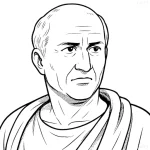“He does not seem to me to be a free man who does not sometimes do nothing.”

- January 3, 106 BC – December 7, 43 BC
- Roman
- Orator, Philosopher, Statesman, Lawyer, Author
table of contents
Quote
“He does not seem to me to be a free man who does not sometimes do nothing.”
Explanation
Cicero argues that true freedom includes the ability to be at rest, to disengage from constant labor or duty. A person who is never allowed—or never allows himself—to do nothing, to reflect, relax, or simply be, is in some sense still in bondage. Freedom is not just political or legal liberty, but also the inner autonomy to step away from obligation and action when one chooses.
In the Roman Republic, where civic duty and public life were held in the highest regard, Cicero offers a more personal and philosophical vision of liberty. Influenced by Stoic and Epicurean thought, he acknowledges that leisure (otium) is not laziness, but a vital space for self-knowledge, contemplation, and mental health. This was especially meaningful for someone like Cicero, whose political life was filled with turmoil and high-stakes decisions.
In modern life, where productivity is often idolized, the quote challenges our assumptions. Constant busyness may look impressive, but without moments of stillness, a person becomes a servant to routine or expectation. Cicero’s words remind us that freedom includes the right to rest, to daydream, or to pursue joy without purpose—a radical yet essential form of self-ownership in any era.
Would you like to share your impressions or related stories about this quote in the comments section?


